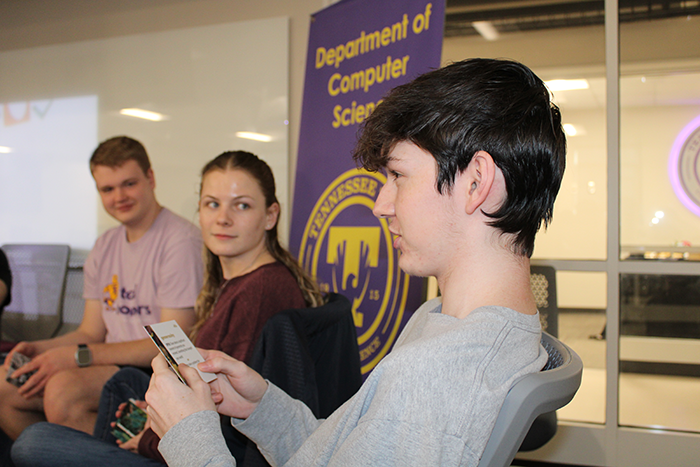Computer Science
Learning to lead: Students and faculty gain skills through LEAD CS

(From Eagle Drive magazine, December 2023)
As Tennessee Tech’s spring 2023 graduates turned their tassels on commencement day,
a group of computer science students celebrated a graduation of their own.
They were among the first cohort to complete a semester-long program called LEAD CS, through which they developed and enhanced their leadership skills and mindsets for when their time comes to make an impression in the computing industry.
“The Department of Computer Science has long understood that to enable the success of our faculty, staff and students that a commitment must be made to develop the whole self and not just focus on academic and scholarly endeavors,” Gerald Gannod, Ph.D., department chair and professor, said.
LEAD stands for Leadership in Education to Accelerate Direction. The program launched in January 2023 with character strengths-based personality assessments and team-building activities and progressed through the semester with virtual sessions and challenges focused on self-awareness, environmental awareness, mentorship, values, culture, conversational dialogue, empathy, ethics and relationship building. It concluded in May 2023 with a full-day celebration featuring “LEAD blueprint” presentations by participants, who shared their leadership identities, goals and vision statements, and a formal dinner and etiquette session at Walton House led by Tennessee Tech First Lady Kari Oldham.
Eleven computer science students were selected as participants through an application process: Landon Crabtree, Sierra Osborne, Bobby Bumbalough, Braxton Westbrook, Edward Gannod, Alyssa Kitchen, Mostaq Hossain, Mariam Gado, Bethany Hedge, Patrick Rhoton and Minh-nghi Vu. Also taking part were senior lecturer April Crockett and freshman advisor Danyelle Hawkins, along with Professor Gannod. Several of the department’s external advisory board members took part as well by mentoring and sharing their expertise from the computing industry.
To better understand their individual leadership styles and strengths, participants used a personality and behavior awareness platform called Tilt 365®. Gado, a Ph.D. candidate, learned she is a “Master Mind” who thrives on structure.
“I need everything to be organized,” she said. “I was surprised to find out not all leaders are like that. The knowledge that there are other leadership styles was the most effective thing I learned from this program.”
Other Tilt profiles included “Quiet Genius” (clarity), “Cross Pollinator” (connection) and “Change Catalyst” (impact).
Landon Crabtree, a junior while participating the program, is a “Quiet Genius.”
“I learned that everybody is different in the way they think about problems,” he said. “The personality profiles gave me insight into how other personalities go about handling stress and confrontation. Knowing that allows you to truly connect with those around you and do your best to help them.”
He said the skills he gained from LEAD CS came in handy during his summer internship as a security engineer with Microsoft.
“That was my first experience working on a large-scale project within a team environment,” he said. “Even if I didn’t necessarily lead the team, leadership skills aren’t confined to leadership roles. If you’re interacting with others, you can use leadership skills.”
Student Alyssa Kitchen, a “Quiet Genius” who is interning with SAIC, said LEAD CS allowed her to grow in both her stronger and weaker areas. While she had confidence in her conversational skills going into the program, she had no experience in professional presence and business etiquette. Now she feels more prepared.
“Knowing how to communicate respectfully and effectively is such an important skill, as well as knowing who is in your network and how to network,” she said. “We also talked about our personal values, which will make choosing a company that aligns with my values so much easier.”
The LEAD CS graduates were able to put their skills to work through the computer science department’s house system. When students join the program, they are sorted into one of six “houses” named after pioneering computer scientists Alan Turing, Anita Borg, John von Neumann, Ada Lovelace, Grace Hopper and Edsger Dijkstra. These houses, which serve approximately 880 undergraduate and graduate students, provide an avenue for establishing smaller learning communities and mentorship opportunities within the university’s largest undergraduate program.
“As new students come in, we are prepared to mentor them during their first year in college,” Kitchen said.
Gannod said LEAD CS is also beneficial for professional development. That’s why the second cohort, which launched in July 2023, consisted of computer science faculty and staff members, many of whom are newly hired.
“We want to prepare the next generation of faculty to come through and lead this department – lead research groups, lead committees, lead whatever it is that they’re going to lead here at the university,” he said.
Like the first session of LEAD CS that was offered to students, the faculty and staff version, which concluded in May 2024, emphasized the value of mentorship. Participants, or mentees, included professors Amani Altarawneh, Maanak Gupta, Amr Hilal, Muhammad Ismail, Zulkar Nine, Mir Pritom and Susmit Shannigrahi; lecturers Eric Brown, Travis Brummett and Jacob Strickler; and outreach coordinator Amy Davis.
Crockett and Hawkins from the first cohort served as mentors in the second, along with computer science professors William Eberle, Anthony Skjellum, Doug Talbert and Mike Rogers. Mentors from other campus departments included Allen MacKenzie, associate dean of research and professor of electrical and computer engineering; Michael Allen, interim chair and professor of mathematics; Colin Hill, director of the School of Music; Jeannette Luna, chair and associate professor of earth sciences; and Robby Sanders, interim chair for chemical engineering and associate professor.
Lean More About Our Programs

